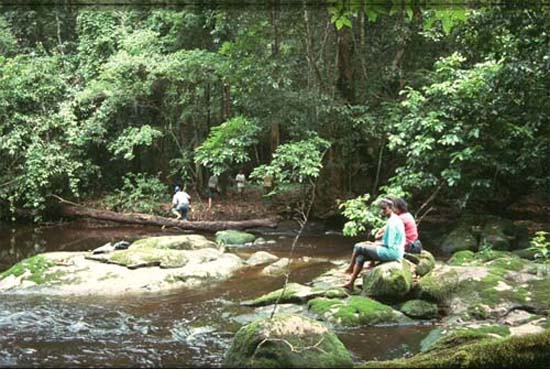
I had an opportunity to visit two friends doing a tour in the Peace Corps in Suriname
Today's Question: What do a group of families who make their homes deep in the Amazon jungle, 100 miles by river from the nearest road (or store), have in common with Fools?
Glad you asked.
This past vacation [Editor's note: ETurkey uses "vacation" in a rather idiosyncratic way -- banish thoughts of Club Med from your brain] I had an opportunity to visit two friends doing a tour in the Peace Corps in Suriname. If you're hunting for a map, Suriname is nestled into the north-east coast of South America right next to French Guyana (think Devil's Island, and Papillon). My friends had the good (?) fortune to be assigned in a very small, very remote Amer-Indian village.
The scene: no electricity, no plumbing, no running water, no phones, no regular mail, and no emergency medical attention available. At night, you can get the BBC World Service and VOA on the short wave if you need to know what's going on in the world, not that you could do anything about it anyway.
The journey to that remote village was, well, interesting: 18 hours of flights and poor connections to Paramaribo, Suriname's capital (where the official language is, to this day, Dutch), followed by two hours by bus on that Surinamese rarity -- a road, followed by a 12-15 hour overnight ride on the deck of a small, once-a-week cargo boat taking fuel upriver to a timber camp.
Are we there yet?
Not quite.
The cargo boat was left for a dugout canoe at the timber camp to make the next leg of the journey: another 20 miles or so upriver (5-6 hours of paddling or 2 hours of cruising if you have a motorized canoe). Hop out of the canoe at the village, and voila -- only a short 1/2 mile walk via trail to their home. We didn't take the 1/2 mile trail, of course. We took the 200 yard short cut -- through a swamp.
Still with me here? Good. The 350 people in the village subsist on meat that they hunt, fish that they catch and crops that they grow in land cleared in the jungle. The standard "house" is a thatched hut with one room enclosed and one simply covered, but open, for cooking and living.
As I lay there swinging (and sweating) in my hammock, my bed for the week, living with this ancient, native tribe, watching the monkeys, parrots, toucans, macaws, bats, lizards, and tarantulas, very far from the land of iomega mania, I couldn't help wondering to myself: "Yeah, but are they Fools?"
Let's take a look. The top three investment objectives of this small community are:
1. A dock on the river.
2. A school.
3. Solar-powered electricity.
To elaborate a bit on the fundamentals involved here:
1. The old dock (you know, the one a cargo boat would need to rope up to if it was actually going to come this far upriver) is broken down and in need of repair. The choice the villagers faced was this: make quick temporary repairs to get it functional, or look to build a solid one that will last. The community chose to build the dock that will last many years, not many months. After all, shipping anything in is not an easy chore, and they wanted a job done properly, even if it meant continued short term hardship putting up with their broken-down dock a bit longer--a basic infrastructure decision.
2. A school. This one just about speaks for itself. It is difficult to think of a better long term investment than education. Give a man a fish and you've fed him for the day. Teach him to fish and you've fed him for life.
3. Solar powered electricity. The principal purpose for the power to be generated would be to freeze meat that gets caught but not immediately eaten and to refrigerate other food stuff and medicine in the clinic. Electricity will also kill the need to ship in much of the kerosene and batteries that get used, keep homes lit and at the same time help lengthen the days into more productive ones. A solid move to improve the home. Homes are great long term investments.
All three of these endeavors are, of course, linked together. No matter what society we live in, the first serious investments must start at home, not in the futures and fortunes of far away companies. Fundamental investments close to home are the ones that will pay off over a lifetime. As a group, these villagers are investing for the future. No one should be looking to stocks and bonds until the family and community structure is soundly in place.
Very Foolish.
Still with me here? Good. Now let me tell you about the poisonous snake that dropped out of a tree not five feet from my hammock, when that cargo boat crashed into...
Transmitted: 10/4/96
